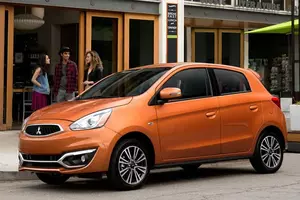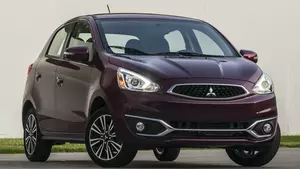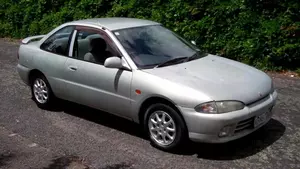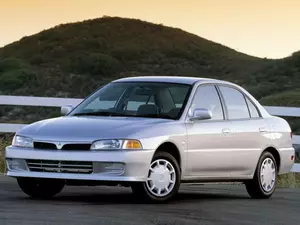
| Vehicle | Curb weight | Difference from world's smallest | Weight to power ratio | 0—60 mph acceleration ratio | Consumption ratio |
|---|---|---|---|---|---|
| 1.2 MIVEC |
905 kg / 1996 lbs |
480 kg (1059 lbs) heavier | 11 kg to 1 hp | 71 kg/s (157 lbs/s) | - |
| Vehicle | 1.2 MIVEC |
|---|---|
| Curb weight |
905 kg / 1996 lbs |
| Difference from world's smallest | 480 kg (480 lbs) heavier |
| Weight to power ratio | 11 kg to 1 hp |
| 0—60 mph acceleration ratio | 71 kg/s (157 lbs/s) |
| Consumption ratio | - |

| Vehicle | Curb weight | Difference from world's smallest | Weight to power ratio | 0—60 mph acceleration ratio | Consumption ratio |
|---|---|---|---|---|---|
| 1.2 MIVEC |
943 kg / 2079 lbs |
518 kg (1142 lbs) heavier | 12 kg to 1 hp | - | - |
| Vehicle | 1.2 MIVEC |
|---|---|
| Curb weight |
943 kg / 2079 lbs |
| Difference from world's smallest | 518 kg (518 lbs) heavier |
| Weight to power ratio | 12 kg to 1 hp |
| 0—60 mph acceleration ratio | - |
| Consumption ratio | - |

| Vehicle | Curb weight | Difference from world's smallest | Weight to power ratio | 0—60 mph acceleration ratio | Consumption ratio |
|---|---|---|---|---|---|
| 1.2 MIVEC |
915 kg / 2018 lbs |
490 kg (1081 lbs) heavier | 12 kg to 1 hp | - |
141 kg/L (311 lbs/L) |
| Vehicle | 1.2 MIVEC |
|---|---|
| Curb weight |
915 kg / 2018 lbs |
| Difference from world's smallest | 490 kg (490 lbs) heavier |
| Weight to power ratio | 12 kg to 1 hp |
| 0—60 mph acceleration ratio | - |
| Consumption ratio |
141 kg/L (311 lbs/L) |

| Vehicle | Curb weight | Difference from world's smallest | Weight to power ratio | 0—60 mph acceleration ratio | Consumption ratio |
|---|---|---|---|---|---|
| 1.2 MIVEC |
955 kg / 2106 lbs |
530 kg (1169 lbs) heavier | 12 kg to 1 hp | - |
143 kg/L (315 lbs/L) |
| Vehicle | 1.2 MIVEC |
|---|---|
| Curb weight |
955 kg / 2106 lbs |
| Difference from world's smallest | 530 kg (530 lbs) heavier |
| Weight to power ratio | 12 kg to 1 hp |
| 0—60 mph acceleration ratio | - |
| Consumption ratio |
143 kg/L (315 lbs/L) |

| Vehicle | Curb weight | Difference from world's smallest | Weight to power ratio | 0—60 mph acceleration ratio | Consumption ratio |
|---|---|---|---|---|---|
| 1.2 MIVEC |
920 kg / 2029 lbs |
495 kg (1092 lbs) heavier | 12 kg to 1 hp | - |
156 kg/L (344 lbs/L) |
| 1.0 MIVEC |
860 kg / 1896 lbs |
435 kg (959 lbs) heavier | 12 kg to 1 hp | - | - |
| Vehicle | 1.2 MIVEC |
|---|---|
| Curb weight |
920 kg / 2029 lbs |
| Difference from world's smallest | 495 kg (495 lbs) heavier |
| Weight to power ratio | 12 kg to 1 hp |
| 0—60 mph acceleration ratio | - |
| Consumption ratio |
156 kg/L (344 lbs/L) |
| Vehicle | 1.0 MIVEC |
| Curb weight |
860 kg / 1896 lbs |
| Difference from world's smallest | 435 kg (435 lbs) heavier |
| Weight to power ratio | 12 kg to 1 hp |
| 0—60 mph acceleration ratio | - |
| Consumption ratio | - |

| Vehicle | Curb weight | Difference from world's smallest | Weight to power ratio | 0—60 mph acceleration ratio | Consumption ratio |
|---|---|---|---|---|---|
| 1.3 i 12V |
985 kg / 2172 lbs |
560 kg (1235 lbs) heavier | 11 kg to 1 hp | 83 kg/s (183 lbs/s) | - |
| 1.6 i 16V |
1080 kg / 2381 lbs |
655 kg (1444 lbs) heavier | 6 kg to 1 hp | 148 kg/s (326 lbs/s) | - |
| 1.5 i 16V |
980 kg / 2161 lbs |
555 kg (1224 lbs) heavier | 9 kg to 1 hp | 98 kg/s (216 lbs/s) | - |
| Vehicle | 1.3 i 12V |
|---|---|
| Curb weight |
985 kg / 2172 lbs |
| Difference from world's smallest | 560 kg (560 lbs) heavier |
| Weight to power ratio | 11 kg to 1 hp |
| 0—60 mph acceleration ratio | 83 kg/s (183 lbs/s) |
| Consumption ratio | - |
| Vehicle | 1.6 i 16V |
| Curb weight |
1080 kg / 2381 lbs |
| Difference from world's smallest | 655 kg (655 lbs) heavier |
| Weight to power ratio | 6 kg to 1 hp |
| 0—60 mph acceleration ratio | 148 kg/s (326 lbs/s) |
| Consumption ratio | - |
| Vehicle | 1.5 i 16V |
| Curb weight |
980 kg / 2161 lbs |
| Difference from world's smallest | 555 kg (555 lbs) heavier |
| Weight to power ratio | 9 kg to 1 hp |
| 0—60 mph acceleration ratio | 98 kg/s (216 lbs/s) |
| Consumption ratio | - |

| Vehicle | Curb weight | Difference from world's smallest | Weight to power ratio | 0—60 mph acceleration ratio | Consumption ratio |
|---|---|---|---|---|---|
| 1.3 i 12V |
930 kg / 2051 lbs |
505 kg (1114 lbs) heavier | 11 kg to 1 hp | - | - |
| 1.5 |
1080 kg / 2381 lbs |
655 kg (1444 lbs) heavier | 10 kg to 1 hp | - | - |
| Vehicle | 1.3 i 12V |
|---|---|
| Curb weight |
930 kg / 2051 lbs |
| Difference from world's smallest | 505 kg (505 lbs) heavier |
| Weight to power ratio | 11 kg to 1 hp |
| 0—60 mph acceleration ratio | - |
| Consumption ratio | - |
| Vehicle | 1.5 |
| Curb weight |
1080 kg / 2381 lbs |
| Difference from world's smallest | 655 kg (655 lbs) heavier |
| Weight to power ratio | 10 kg to 1 hp |
| 0—60 mph acceleration ratio | - |
| Consumption ratio | - |

| Vehicle | Curb weight | Difference from world's smallest | Weight to power ratio | 0—60 mph acceleration ratio | Consumption ratio |
|---|---|---|---|---|---|
| 1.3 i 12V |
970 kg / 2139 lbs |
545 kg (1202 lbs) heavier | 11 kg to 1 hp | - | - |
| 1.6 i 16V |
970 kg / 2139 lbs |
545 kg (1202 lbs) heavier | 6 kg to 1 hp | - | - |
| Vehicle | 1.3 i 12V |
|---|---|
| Curb weight |
970 kg / 2139 lbs |
| Difference from world's smallest | 545 kg (545 lbs) heavier |
| Weight to power ratio | 11 kg to 1 hp |
| 0—60 mph acceleration ratio | - |
| Consumption ratio | - |
| Vehicle | 1.6 i 16V |
| Curb weight |
970 kg / 2139 lbs |
| Difference from world's smallest | 545 kg (545 lbs) heavier |
| Weight to power ratio | 6 kg to 1 hp |
| 0—60 mph acceleration ratio | - |
| Consumption ratio | - |